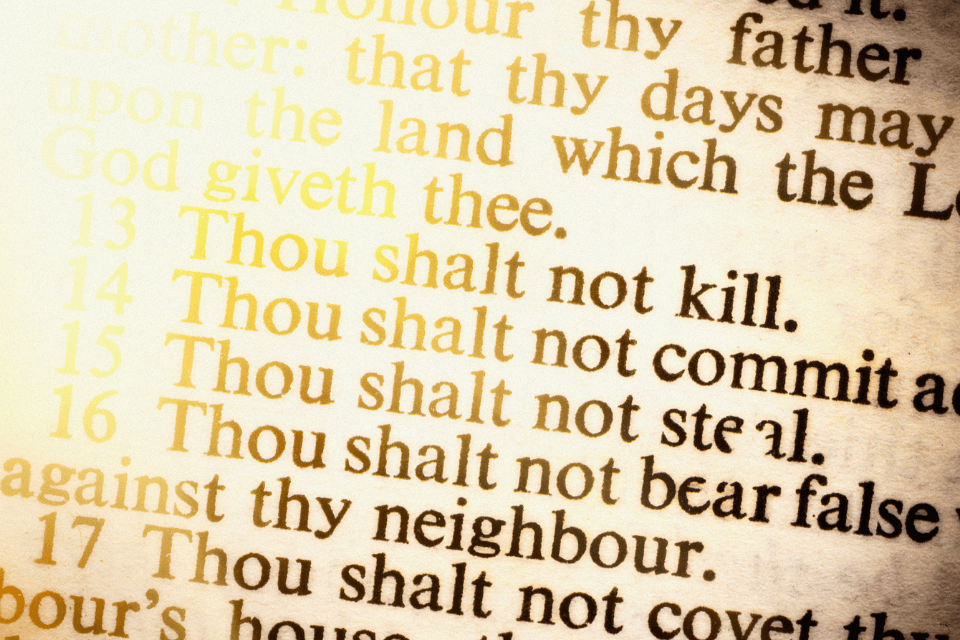Retired pastor Glenn Wagner gives the context and history behind the Ten Commandments and then asks why we should care about them today.
GLENN M. WAGNER
Michigan Conference Communications
These important biblical laws were brought to life for many Americans by filmmaker Cecile B. DeMille through his two famous movies called The Ten Commandments. DeMille’s 1923 version appeared on the silent screen. His four-hour-long remake in 1956, starring Charlton Heston as Moses, added dialogue and was nominated for seven Academy Awards, winning the Oscar for Best Visual Effects. These movies helped many visualize the dramatic context and significance of these divine laws. Within three years of releasing his 1956 version, 98.5 million people had seen the movie. Over the years, millions more have seen reruns of the film on television to coincide with Easter and Passover.
So, what is the significance of the Ten Commandments, and why should we care about them today as Christians? And what difference does it make if we choose to obey them or not?
What Are the Ten Commandments?
The Ten Commandments are rules for humanity attributed to God. They are important for living faithfully for God and living well with our neighbors.
In abbreviated format and order, they are:
-
- You shall have no other gods before me.
- You shall not make idols.
- You shall not take the name of the Lord your God in vain.
- Remember the Sabbath day to keep it holy.
- Honor your father and your mother.
- You shall not murder.
- You shall not commit adultery.
- You shall not steal.
- You shall not bear false witness against your neighbor.
- You shall not covet.
The Ten Commandments are listed twice in the Bible (Exodus 20:2-17 and Deuteronomy 5:6-21). In addition, Leviticus 19 contains a partial set of the Ten Commandments (see verses 3-4, 11-13, 15-16, 30, 32). Christians also believe in the two Great Commandments articulated centuries later by Jesus, which summarize the Ten Commandments succinctly by calling us to love the Lord our God with all our heart, soul, mind, and strength and to love our neighbors as ourselves (Matt. 22:35-40, cf. Deut. 6:4-5 and Lev. 19:18).
The remembrances of the Ten Commandments in Exodus 20:2-17 and Deuteronomy 5:6-21 are nearly identical, with one major difference being the rationale explaining the fourth commandment given by God for creating a Sabbath day and commanding that it be kept holy. The Exodus listing of this fourth commandment links the reason for the Sabbath to the Genesis accounting of creation. As God has rested after seven days of labor, so should we (see Gen. 1:1–2:2).
In the record of the Ten Commandments in Deuteronomy, a different reason is given for Sabbath observance. In Deuteronomy 5:12-15, we are reminded never to forget how God has delivered his people from the bondage of slavery. Enslaved people are not afforded a day of rest. Deuteronomy explains Sabbath as a wonderful gift and a weekly opportunity to offer thanks to our divine benefactor for freedom from the oppression of slavery.
As further encouragement for Sabbath observance, medical studies confirm that taking a day to rest each week benefits our health.
My experience is that weekly gathering in community for worship has fostered significant relationships, taught essential life skills, and fostered life-changing service.
Where Did the Ten Commandments Come From?
The Bible credits Moses with delivering the Ten Commandments as laws from God for God’s people to observe.

Born to a family of Hebrew slaves in Egypt, Moses escaped the Egyptian infanticide of Hebrew boys that was being enforced to control the slave population. His mother hid Moses in the reeds by the Nile River, where he was discovered, rescued, and adopted by the daughter of the Egyptian pharaoh. Raised in the royal household of Egypt, Moses was later called by God to liberate the enslaved Hebrews—descendants of Abraham—and to lead them to freedom.
The story of Moses and the dramatic deliverance from slavery is remembered in the biblical book of Exodus, which recalls the sage advice given to Moses by his father-in-law, Jethro, the priest of Midian. Moses was overwhelmed by new responsibilities leading a large group of former slaves in the harsh conditions of the Sinai wilderness following their liberation from generations of slavery in Egypt. Jethro advised Moses of the importance of choosing able and honest assistants to help him adjudicate the rules for the masses. “If you do this and God directs you, then you will be able to endure. And all these people will be able to go back to their homes much happier” (Exodus 18:23, CEB).
During the forty years of the exodus in the wilderness, God is credited with giving Moses the Ten Commandments on the summit of Mount Sinai. These commandments, etched on stone tablets and delivered by Moses to his people as divine writ, have proven themselves as foundational rules for believers in three of the world’s major Abrahamic faith traditions: 2.38 billion Christians, 1.91 billion Muslims, and 14.6 million Jews.
Why Are the Ten Commandments Important?
The Ten Commandments are understandable rules that help us to prioritize what is most important.
The Oxford English Dictionary defines rules as “one of a set of explicit or understood regulations or principles governing conduct within a particular activity or sphere.”
More simply, rules can be understood as dos and don’ts for any activity.

Rules can be helpful. On the highways, rules of the road allow drivers to navigate safely. In sports, rules help athletes compete fairly. In jurisprudence, rules help settle disputes and govern behavior.
Humanity has been living by rules for millennia. Archaeologists credit Hammurabi, the sixth king of the Amorite First Dynasty of Babylon from 1792-50 BC, for establishing one of the earliest known codes of conduct. Before Hammurabi, even earlier law codes have been unearthed and credited to Ur-Nammu of Ur, Lipit-Ishtar of Isin, and the laws of Eshnunna.
History confirms that life is more manageable in community if rules governing interactions are established, widely accepted, and fairly enforced.
Rules are acknowledged as important not just in ancient history but also in our United States system of governance. Our Supreme Court building in Washington D.C. is adorned on its exterior walls with friezes honoring 18 of the world’s most respected lawgivers. One of the celebrated lawgivers is Moses for giving the Ten Commandments.
The Ten Commandments establish basic boundaries for relationships that are foundational for living together in community. Unlike more detailed law codes that fill volumes and require experts to study, interpret, and adjudicate, establishing a simple set of rules numbering no more than the ten fingers of our hands helps these laws to be practiced and remembered, especially given their first context among a wandering band of slaves who may have been largely illiterate.
The first three commandments pledge our ultimate allegiance, not to self or anyone else but God. God is to be honored. God’s name is to be respected. God is not to be belittled by idolatry. Our American Pledge of Allegiance affirms the supremacy of God when we recite that we are one nation under God. Commandments four through ten shift from giving our allegiance to God to helping us to understand what honoring God means. The final six commandments govern human impulses and help us to live in harmony with our neighbors.
Why Should We Care about the Ten Commandments?
The consequences of lawlessness are painfully evident in the world around us. If all were law-abiding citizens, we would have less need for police, armies, judges, and counseling centers. It should be self-evident that life is better for most of us when we work together for a world where everyone understands and abides by the rules.
The Old Testament of the Bible reminds us of the history of Abraham’s descendants, which includes memories of faithfulness followed by periods of disobedience leading to great suffering. This pattern of response to God’s commandments continues. Many of us still wrestle with rules. Most can agree that rules are beneficial while easily finding rationalizations for why personal exceptions should be granted when rules like the Ten Commandments conflict with our specific circumstances. Excuses made for not obeying the Ten Commandments are still very common. Application of these beneficial commandments is not easy.
-
- You shall have no other Gods before me. We often put peer pressure, desired possessions, and self-interest first when making decisions.
- You shall not make idols. We have been known to idolize movie stars, athletes, and talented musicians. We spend far more time on our electronic devices than we do in study, devotion, and service to our faith. On a visit to Taiwan, I noticed that practitioners of another religion established altars dedicated to their handmade gods as the focal point of the main living space in their homes in a way that reminded me of American living spaces that give pride of place to our televisions.
- You shall not take the name of the Lord your God in vain. Taking the Lord’s name in vain is a staple of prime-time television entertainment and locker-room conversations. Respecting God enough to honor God’s name with our choice of vocabulary is an important act of faith.
- Remember the Sabbath day to keep it holy. We know that keeping Sabbath is important, but other interests and needs often fortify excuses to skip keeping Sabbath reserved for rest and honoring God. Recent statistics show that 31% of Americans never attend religious services, and only 22% make weekly worship a priority.
- Honor your father and your mother. Honoring parents is understandable, but some parents are undeserving of respect.
- You shall not murder. It is easy to see that murder is wrong. But 6.9 people per 100,000 in population were murdered last year in the United States. Murder is often featured as entertainment, indirectly benefiting those who exploit the drama to capture eyeballs for advertisers. Selling deadly weapons to the public is big business. Fortune Business Insights estimates that selling guns and accessories in the U.S. generated $6.14 billion in 2019.
- You shall not commit adultery. A recent survey confirms that 90% of Americans consider adultery immoral, but more than 30% of respondents admit to cheating on their partners. Popular entertainment regularly features adulterous acts.
- You shall not steal. Anyone who has ever had valuables stolen understands the powerful feelings of being violated by someone else. Locks on doors, security safes in homes, password protection for computers, and security cameras in doorbells are all meant to help prevent theft in the first place. Statistics indicating that nearly 1.5 million Americans had their identities stolen and suffered 43 billion dollars in fraud loss last year remind us that stealing is a problem that cannot be ignored.
- You shall not bear false witness against your neighbor. Bearing false witness seems too common among politicians seeking favors from powerful benefactors. Liars often seem to get away with their falsehoods.
- You shall not covet. Coveting is often successfully used as a ploy without shame in marketing products.
Public efforts continue to support the Ten Commandments with consequences for disobedience through blue laws. These blue laws, which restrict commerce on Sunday and sometimes prevent alcohol sales, are still found in 28 states. Michigan still prohibits Sunday sales of automobiles. Penalties continue to be meted out for persons caught and proven guilty in court for murder, stealing, and perjury.
An honest review of my own behavior reveals that living by rules has never been easy for me. I remember uncomfortable consequences given to teach me respect for the rules. A soapy mouthwash was administered for taking the Lord’s name in vain rather loudly in the church parking lot. I will not forget being exiled to the time-out chair for losing my temper. I was sent to detention after school for engaging in a food fight in the cafeteria at lunch. I remember being disciplined by parents with lost privilege for not honoring the commands of my father and mother and disrespecting our babysitter. A football coach benched me for setting the team back 15 yards by the referee for a personal foul. A police officer pulled me over for speeding on my way to visit a parishioner in the ICU unit at the hospital. The expensive ticket continues to remind me to be more careful with my driving.
It seems a shame that we still need people to enforce rules and administer consequences for failure to follow them.
What Difference Does It Make if We Choose to Obey the Ten Commandments?
In 1993, I had the privilege of traveling back to the Middle East as part of a study tour that included a day-long visit to Mount Sinai in the midst of the Egyptian Sinai Peninsula. Mount Sinai is the traditional site recognized as the location where Moses received the Ten Commandments from God. After the arduous 7,497-foot hike on a well-worn path to the summit of this sacred mountain, and before I could admire the ancient chapel and caves around me, I was unexpectedly met at the top by a Bedouin vendor selling rocks. Our daughter had requested before we left on the trip that if I should make it to Mount Sinai: “Please bring me back a piece of the Ten Commandments!” I purchased a quartz crystal from the Bedouin’s sack of stones. He claimed that the rock was from the mountain.

Holding the stone, I found another larger rock to sit on while contemplating the commanding vista of the barren wilderness visible from the top of the mountain for miles in every direction. I was suddenly aware in a new way of the power and necessity of the Ten Commandments. Without a freely and willingly shared commitment to these divinely inspired rules during the 40 years of living together in the Sinai wilderness by all the liberated slaves, there would be no hope for group survival in such hostile conditions. On that sacred mountaintop, I saw God’s commands clearly as a gift of life, obeyed not reluctantly or for fear of punishment or because we must, but willingly, freely, and gratefully because we know how good they are for living and how good God is when compared to former slave masters.
This insight from the Sinai was reinforced more than a decade later when I witnessed a remarkable gift. A church member donated a kidney to save the life of a friend. Before the transplant, the recipient of the gift was regularly tied to a dialysis machine. Life was fragile and failing fast. The unexpected gift of a new kidney saved the recipient’s life, which was now filled with continual gratitude and a desire to spend each day honoring the giver and the life-saving gift by making the most out of life. No police officer was needed to coerce the recipient of new life not to abuse the gift. No one ever needed to convince the recipient to live in perpetual gratitude to the donor.
Wouldn’t this be a better world for all of us if we could each embrace God’s commands freely as a great life-saving gift and with similar gratitude?
Because of Christ’s sacrificial love for each of us, it is fitting to choose to embrace God’s commandments for our lives willingly.
I hope I can regularly obey God’s commandments not for fear of punishment, by making excuses, or by wasting energy judging others or myself for noncompliance. My prayer is that we will each freely embrace God’s essential commandments as priorities for life with abiding gratitude for the giver and the gift.
Last Updated on October 20, 2022

